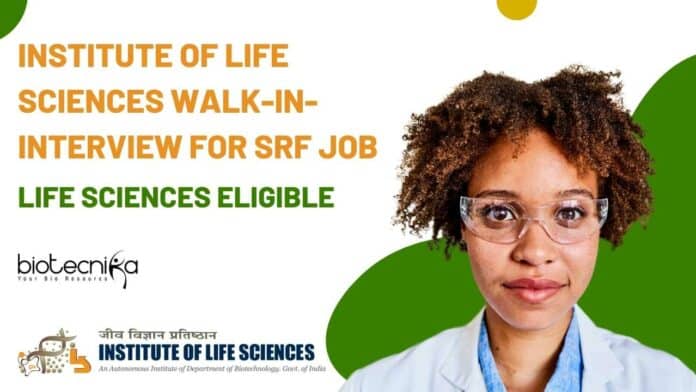ILS Post Life Sciences SRF Job Opening – Attend Walk-In
ILS Post Life Sciences SRF Job Opening – Attend Walk-In. Institute of Life Sciences (ILS) is conducting a Walk-in Interview for SRF Position for M.Sc. in Life Sciences / Biochemistry / Biotechnology / Microbiology, etc. Interested and eligible candidates check out the details below.
The possible interview questions and answers for Walk-in Interview for SRF Position are posted below
INSTITUTE OF LIFE SCIENCES
(An Autonomous Institute under the Dept. of Biotechnology,
Ministry of Science & Technology, Govt. of India)
NALCO Square, Bhubaneswar 751023, India
Advt. No. 21/2023
tyle="text-align: center;">Walk-in Interview for SRF Position
Institute of Life Sciences (ILS), Bhubaneswar, an autonomous institute of the Department of Biotechnology, Ministry of Science & Technology, Government of India will be conducting a walk-in-interview from the Indian Nationals for the appointment of the following temporary position in an ongoing project.
Name of position: Senior Research Fellow (01 position)
Project: DBT sponsored Project “Genetic Enhancement of Minor Pulses: Characterization, Evaluation, Genetic Enhancement and Generation of Genomic Resources for Accelerated Utilization and Improvement of Minor Pulses”
Age Limit: The candidate should be below 32 years in age, as on 11.07.2023. Age relaxation will be provided a s per Govt. of India rules.
How to Apply:
Interested/eligible candidates may download the application form from our website www.ils.res.in and attend the interview with the filled application form along with attested copies of mark sheets and certificates, experience certificate, age proof, caste certificate (if any). Incomplete applications and applications submitted without the above-mentioned documents will be rejected.
The candidate will not have any right to claim explicit or implicit any post in the institute. No TA/DA will be paid for attending the interview. The decision of the Director, ILS regarding selection of candidates will be final and no further correspondence will be entertained in this regard.
- Date and time of interview: 11.07.2023; 10.00 AM
- Venue: Institute of Life Sciences (ILS) Nalco Square, Bhubaneswar
Fellowship: Rs. 35,000/- + @ 16% HRA per month
Eligibility:
- M.Sc. or an equivalent qualification in Life Sciences or allied subjects such as Biochemistry/ Biotechnology/ Biophysics/ Microbiology, etc. with a minimum of 55% marks or an equivalent grade point (50% for OBC/ST/SC) are eligible to apply.
- Candidates should have NET-JRF/NET-LS/GATE qualifications.
- A minimum of two years of research experience in a research laboratory is mandatory.
- Preference will be given to candidates with expertise in the area of Plant Molecular Biology.
Download the application form here
Check the notification below
Here are possible interview questions and answers for Walk-in Interview for SRF Position
1. Question: Can you tell us about your relevant research experience and how it aligns with the objectives of the DBT-sponsored project on genetic enhancement of minor pulses? Answer: During my academic and research journey, I have gained significant experience in the field of genetics and plant breeding, specifically focusing on crop improvement. I have worked on projects involving the characterization and evaluation of genetic resources, marker-assisted breeding, and genomic analysis of crop plants. My research has involved studying the genetic diversity of various minor pulse crops and identifying potential traits for improvement. I believe my expertise in these areas makes me well-suited for the objectives of the DBT-sponsored project on genetic enhancement of minor pulses.
2. Question: What specific techniques and methodologies have you used in your previous research work that could be relevant to this project? Answer: In my previous research work, I have utilized a range of techniques and methodologies for genetic analysis and crop improvement. This includes molecular markers such as SSRs (Simple Sequence Repeats) and SNPs (Single Nucleotide Polymorphisms) for genetic diversity analysis and marker-assisted selection. I have also employed genomic tools like next-generation sequencing and bioinformatics analysis for genome-wide characterization and identification of candidate genes related to important traits. Additionally, I have experience in conducting field trials and phenotypic evaluations for agronomic and qualitative traits. I believe these techniques and methodologies can be effectively applied to the genetic enhancement of minor pulses in the current project.
3. Question: How would you contribute to the generation of genomic resources for the accelerated utilization and improvement of minor pulses as outlined in the project description? Answer: As a Senior Research Fellow, I would play a key role in the generation of genomic resources for minor pulses. I would actively contribute to the collection and characterization of germplasm, ensuring the representation of diverse genetic backgrounds. I would employ high-throughput sequencing technologies to generate transcriptomic and genomic data for these crops. Furthermore, I would utilize bioinformatics tools and databases to analyze and annotate the obtained genomic resources. By integrating this information with phenotypic data, I would identify potential genes or markers associated with desirable traits. Overall, my aim would be to provide valuable insights and resources for the accelerated utilization and improvement of minor pulses.
4. Question: How would you approach the evaluation of genetic diversity in minor pulses and what significance does it hold for crop improvement? Answer: Evaluating genetic diversity in minor pulses is crucial for effective crop improvement. To assess genetic diversity, I would employ various techniques such as molecular markers and genotyping platforms. I would collect representative samples from different geographic regions and analyze their DNA using suitable markers. This analysis would help in understanding the extent of genetic variation and the population structure within the minor pulse crops. By identifying diverse genotypes and unique alleles, we can broaden the genetic base and select parents with complementary traits for breeding programs. Genetic diversity evaluation guides the development of breeding strategies, leading to the creation of improved cultivars with desirable agronomic and quality traits.
5. Question: How do you plan to ensure the successful execution of the project and contribute to its objectives as a Senior Research Fellow? Answer: As a Senior Research Fellow, my primary focus would be on executing the project with precision and achieving the outlined objectives. I would ensure effective coordination with the project team and stakeholders. I would meticulously plan and organize experimental protocols, ensuring the timely collection of germplasm, execution of field trials, and application of molecular techniques. Additionally, I would actively contribute to data analysis, interpretation, and publication of research findings. I would collaborate with other team members, sharing knowledge and expertise to collectively advance the project’s goals. Overall, my dedication, attention to detail, and scientific acumen would contribute to this position.
All the best!
Editor’s Note: ILS Post Life Sciences SRF Job Opening – Attend Walk-In. Please ensure you are subscribed to the Biotecnika Times Newsletter and our YouTube channel to be notified of the latest industry news. Follow us on social media like Twitter, Telegram, Facebook






























